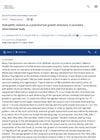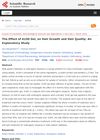
Hair loss can cause significant social and emotional issues, especially for women and young men.
 1 citations,
August 2020 in “Food Research”
1 citations,
August 2020 in “Food Research” Plant extracts like Avicennia marina, Boehmeria nipononivea, and Camellia sinensis could potentially treat hair loss with fewer side effects than synthetic drugs.
 15 citations,
January 1995 in “Archives of Dermatological Research”
15 citations,
January 1995 in “Archives of Dermatological Research” Minoxidil boosts elastin production, potentially helping skin diseases.
 4 citations,
January 2022 in “Life”
4 citations,
January 2022 in “Life” Tissue engineering could be a future solution for hair loss, but it's currently expensive, complex, and hard to apply in real-world treatments.
 August 2024 in “Applied Sciences”
August 2024 in “Applied Sciences” Plant extracts may help prevent or reverse hair graying.
 June 2023 in “Journal of Cosmetic Dermatology”
June 2023 in “Journal of Cosmetic Dermatology” The treatment combining platelet-rich plasma and a non-cross-linked hyaluronic acid compound significantly improved hair density and reduced bald areas in women with androgenetic alopecia, and it's safe with only mild side effects.
 10 citations,
January 2014 in “Endocrinology & metabolic syndrome”
10 citations,
January 2014 in “Endocrinology & metabolic syndrome” PCOS is a long-term condition that needs more research for better understanding and treatment.
 2 citations,
January 2012 in “International Journal of Trichology”
2 citations,
January 2012 in “International Journal of Trichology” Coffee and tea might help hair growth in balding individuals, but side effects and alternative uses are being considered.
 32 citations,
June 2015 in “PLOS ONE”
32 citations,
June 2015 in “PLOS ONE” Olive leaf compound oleuropein helps grow hair in mice.
 18 citations,
November 2014 in “Journal of Agricultural and Food Chemistry”
18 citations,
November 2014 in “Journal of Agricultural and Food Chemistry” Brazilian propolis was found to speed up hair growth in mice by increasing the growth of skin cells that form hair.
 25 citations,
June 2018 in “Clinical and Experimental Dermatology”
25 citations,
June 2018 in “Clinical and Experimental Dermatology” Combined microneedling and minoxidil improves hair growth more than minoxidil alone.
 138 citations,
August 1985 in “Journal of The American Academy of Dermatology”
138 citations,
August 1985 in “Journal of The American Academy of Dermatology” Minoxidil promotes hair growth in male pattern baldness.
 13 citations,
January 1991 in “Dermatology”
13 citations,
January 1991 in “Dermatology” Minoxidil helps hair growth in people with monilethrix without side effects.
 January 2017 in “Cogent Medicine”
January 2017 in “Cogent Medicine” Extracts improve hair growth in alopecia.
 9 citations,
July 2020 in “Experimental Dermatology”
9 citations,
July 2020 in “Experimental Dermatology” Topical L-thyroxine may help with wound healing and hair growth but should be used short-term due to potential risks.
 87 citations,
March 2005 in “Journal of Dermatological Science”
87 citations,
March 2005 in “Journal of Dermatological Science” Asiasari radix extract promotes hair growth and increases protein synthesis and cell proliferation.
 3 citations,
June 2017 in “Journal of Biomaterials Applications”
3 citations,
June 2017 in “Journal of Biomaterials Applications” Keratin extract from human hair was found to promote hair growth in mice.
 26 citations,
October 2016 in “Biomolecules & Therapeutics”
26 citations,
October 2016 in “Biomolecules & Therapeutics” 3-Deoxysappanchalcone helps human hair cells grow and stimulates hair growth in mice by affecting certain cell signaling pathways.
 70 citations,
April 2017 in “Lasers in surgery and medicine”
70 citations,
April 2017 in “Lasers in surgery and medicine” Blue light promotes hair growth by interacting with specific receptors in hair follicles.
 64 citations,
January 2015 in “BioMed Research International”
64 citations,
January 2015 in “BioMed Research International” Certain growth factors can promote hair growth in mice by activating hair growth-related proteins.
 9 citations,
August 2018 in “Biomedical dermatology”
9 citations,
August 2018 in “Biomedical dermatology” A peptide called DPS-1 helps human scalp cells grow and stimulates hair growth in mice.
 8 citations,
September 2017 in “Journal of Natural Medicines”
8 citations,
September 2017 in “Journal of Natural Medicines” Applying an extract from Perilla frutescens helps hair grow and fights the effects of hair loss hormones.
 July 2024 in “Journal of Cosmetic Dermatology”
July 2024 in “Journal of Cosmetic Dermatology” Hydrophilic melanin may help hair grow by improving blood flow and regeneration.
 1 citations,
January 2001 in “Cosmetics and toiletries”
1 citations,
January 2001 in “Cosmetics and toiletries” Procyanidin B-2 from apple juice significantly increases hair growth and may be more effective than minoxidil without side effects.
 51 citations,
January 2012 in “Annals of dermatology/Annals of Dermatology”
51 citations,
January 2012 in “Annals of dermatology/Annals of Dermatology” A boy with alopecia regrew hair using a vitamin D cream after other treatments failed.
 39 citations,
March 1987 in “Journal of The American Academy of Dermatology”
39 citations,
March 1987 in “Journal of The American Academy of Dermatology” Topical minoxidil is a safe and effective treatment for hair loss caused by androgenetic alopecia.
 January 2016 in “Journal of Cosmetics, Dermatological Sciences and Applications”
January 2016 in “Journal of Cosmetics, Dermatological Sciences and Applications” A100 gel may increase hair growth without side effects, but more research is needed.
 102 citations,
February 2008 in “The FASEB Journal”
102 citations,
February 2008 in “The FASEB Journal” One minoxidil-sensitive potassium channel exists in human hair follicles.
66 citations,
February 2007 in “The journal of investigative dermatology/Journal of investigative dermatology” Adenosine may promote hair growth by increasing FGF-7 levels in dermal papilla cells.
 8 citations,
January 2020 in “Skin Pharmacology and Physiology”
8 citations,
January 2020 in “Skin Pharmacology and Physiology” Caffeine improves hair growth, thickness, and reduces shedding.





























